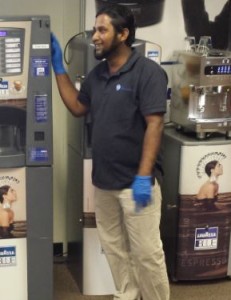Slow climb out of poverty and exclusion – a refugee’s journey
As an ethnic Rohingya growing up in Myanmar and then as an asylum seeker in Malaysia, much of Nasim Ahmed’s life has been lived on the margins of societies which did not really want him.
But the 38-year-old’s resilience and hard work – as well as the help of some committed and passionate teachers – have seen him start to build a new and meaningful life in Melbourne.

After a life of turmoil and displacement, Nasim Ahmed has found a safe haven in Australia
As a Muslim child in Myanmar – where Rohingyas are considered ‘stateless persons’ and are not recognised by the government as one of the official ethnic groups – Nasim’s school life was tenuous.
He was largely excluded; relegated to the back of the classroom and made to sit on the floor without a table and with few writing or reading materials.
“It was very difficult for me. I wanted to learn but we were not really welcome at the school because we were Rohingya,” Nasim said.
When he was just seven years old, Nasim embarked on a hazardous journey to Malaysia with his brother and his sister-in-law. Life in Malaysia was not any easier; they were still stateless and living hand-to-mouth in a technically illegal situation.
In addition, Nasim’s sister-in-law resented him and punished him continually by withholding food and refusing to wash his clothes and care for him.
Nasim was only eight when he left his brother’s home and wandered the streets hungry and penniless.
He knocked on doors, trying to find work, until an Indian restaurant owner took him in to wash dishes in return for board and food.
Nasim worked there for four years, saved some money and moved back to Kuala Lumpur to live closer to his brother.
When he was 18 he married and then had three children in quick succession. Life in Malaysia was impossible for Nasim and his wife, because they were not citizens, did not have visas and their children did not have the right to an education.
They lived with the constant fear of deportation back to Myanmar, back to persecution and violence. Nasim could only afford for his children to attend school one day a week.
At their wits end and desperate to provide for their children, Nasim and his family to fled to Indonesia en-route to Australia with the help of people smugglers.
Initially, as asylum seekers in Australia, Nasim and his wife did not have the right to work or study because they were not permanent residents.
In 2013 they were granted residency status.
“This was a chance for us to build a new life for ourselves and our children. We were very happy,” Nasim said.
The family moved to Melbourne and Nasim began to attend English classes at AMES Australia in Springvale.
Nasim was thrilled to finally be able to learn and work towards his goal of finding employment.
After finishing his English language course, Nasim enrolled in a course designed to give him the skills needed to find a job.
Then, in June 2015 Nasim was employed by a coffee company in Melbourne’s south east.
He now works repairing coffee machines and is building a life for himself and his wife and children.
“I am now a permanent employee and I am very happy,” Nasik said.
“AMES Australia and other people helped me learn more, improve my English so I got a job,”
Nasim’s teacher at AMES Australia said that his success had brought joy and pride to everyone who had a part in Nasim realise his dreams.
“We are so privileged to have been a part of his journey,” Erika said.
“Nasim chose to participate in our programs because he wanted to get the skills he needed to get a job,’ she said.
“He wanted to improve his English and get to know more about Australian workplace practices. His main focus was to improve his employability skills for job seeking purposes.
“Our program aims to give the students some ideas on what it is like to work or study in Australia.
“Nasim is a case in point. He has improved his English language skills and has developed his knowledge about what it takes to get a job in Australia. We are all so proud of him.” Erika said.
Laurie Nowell
AMES Australia Senior Journalist












